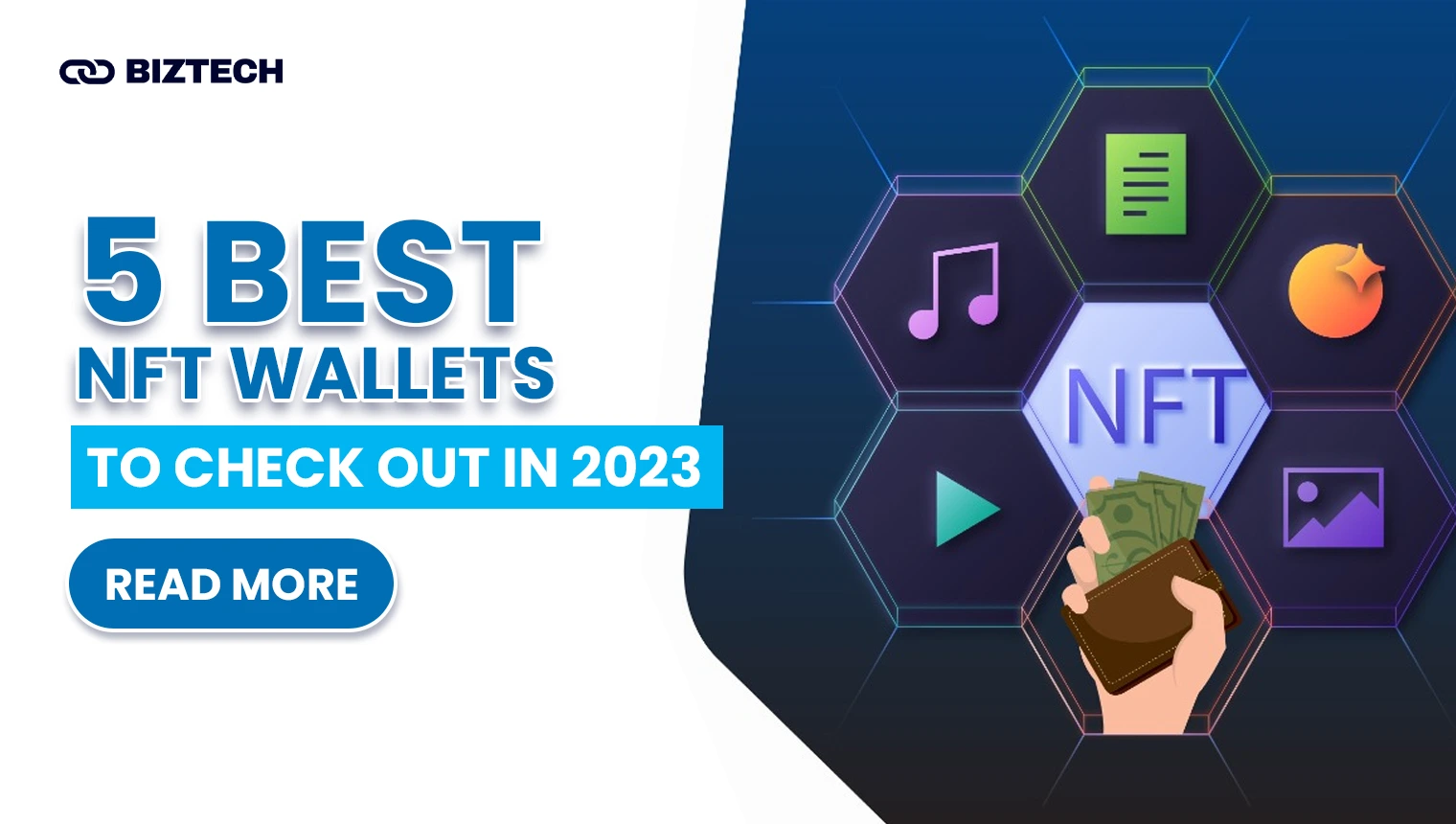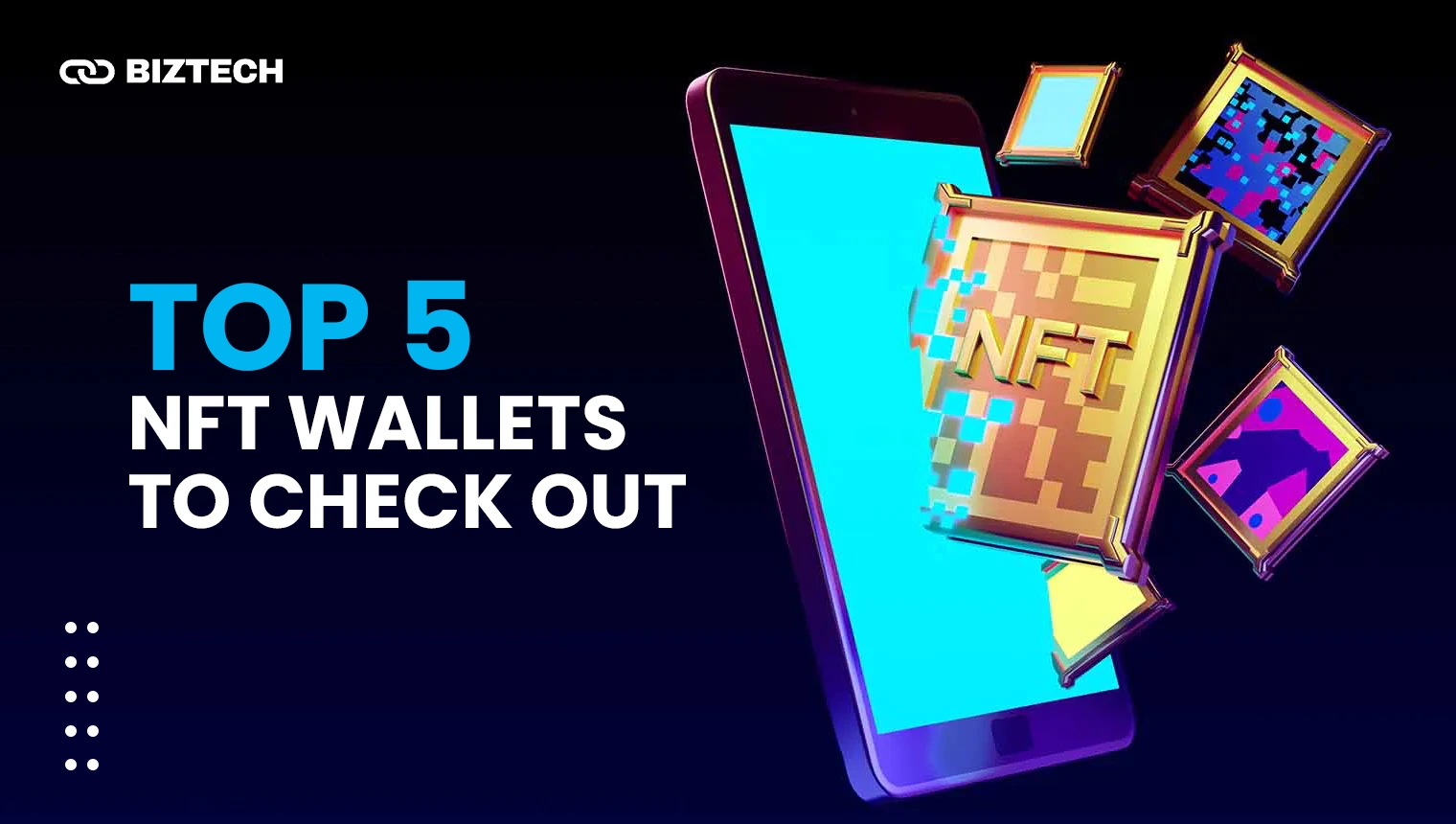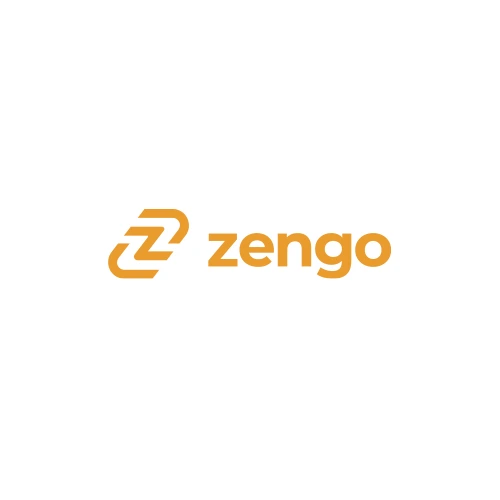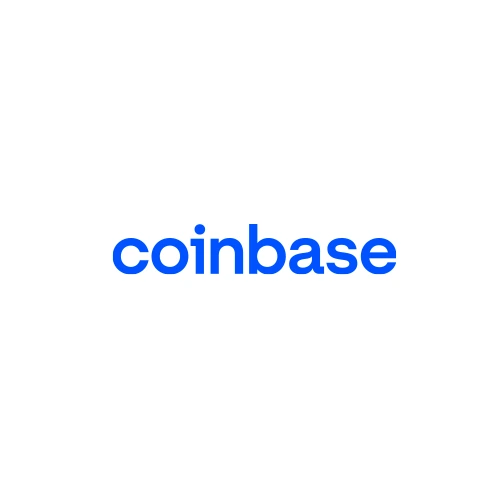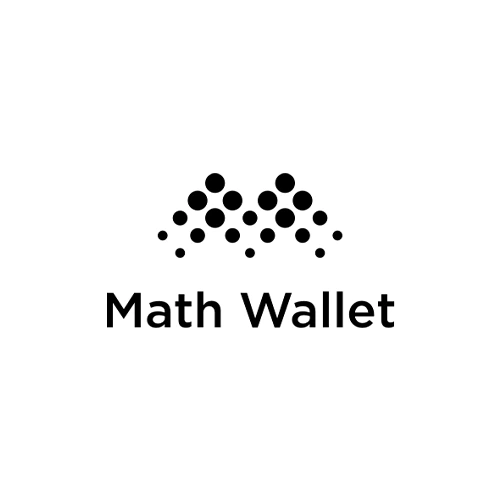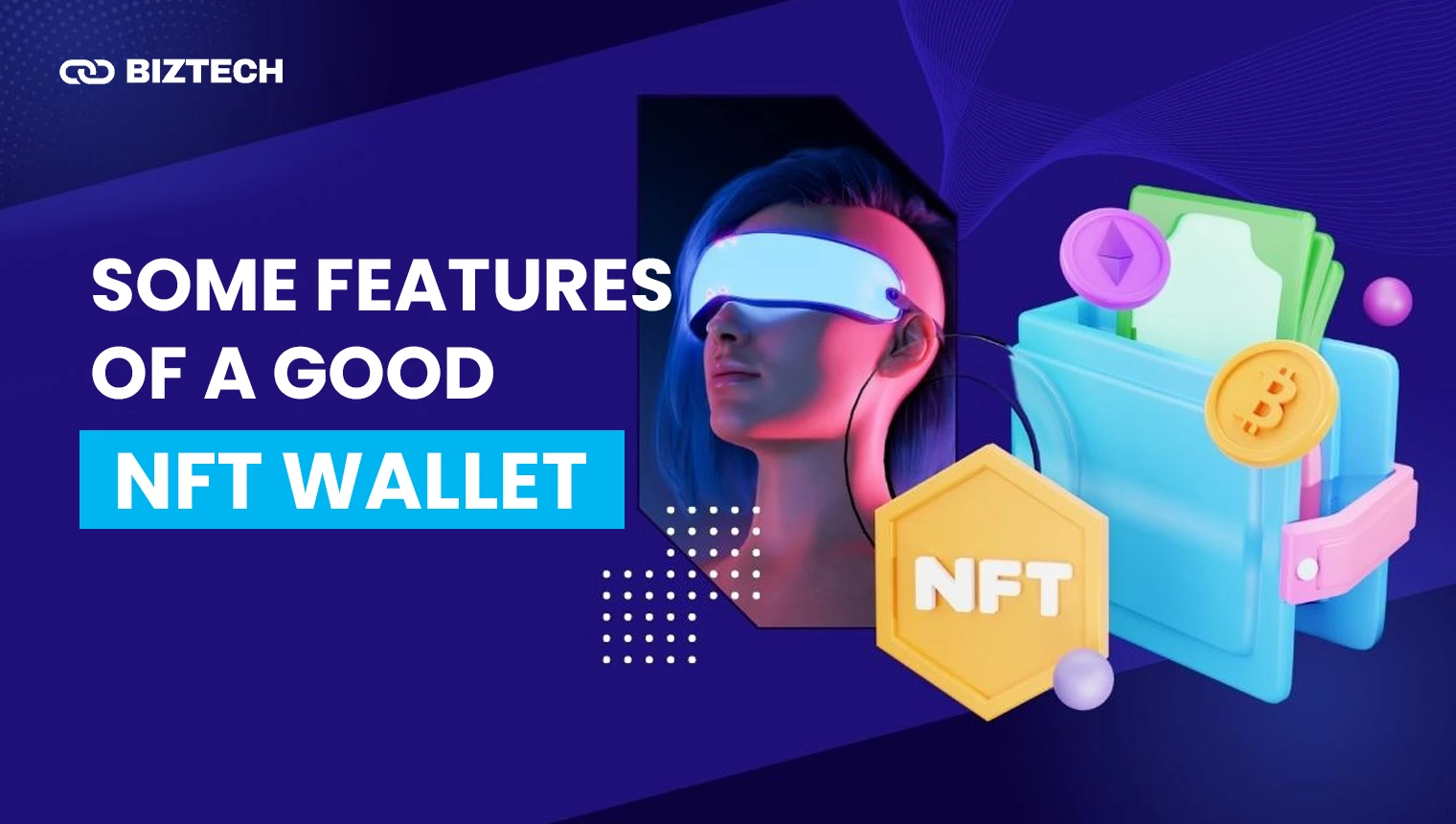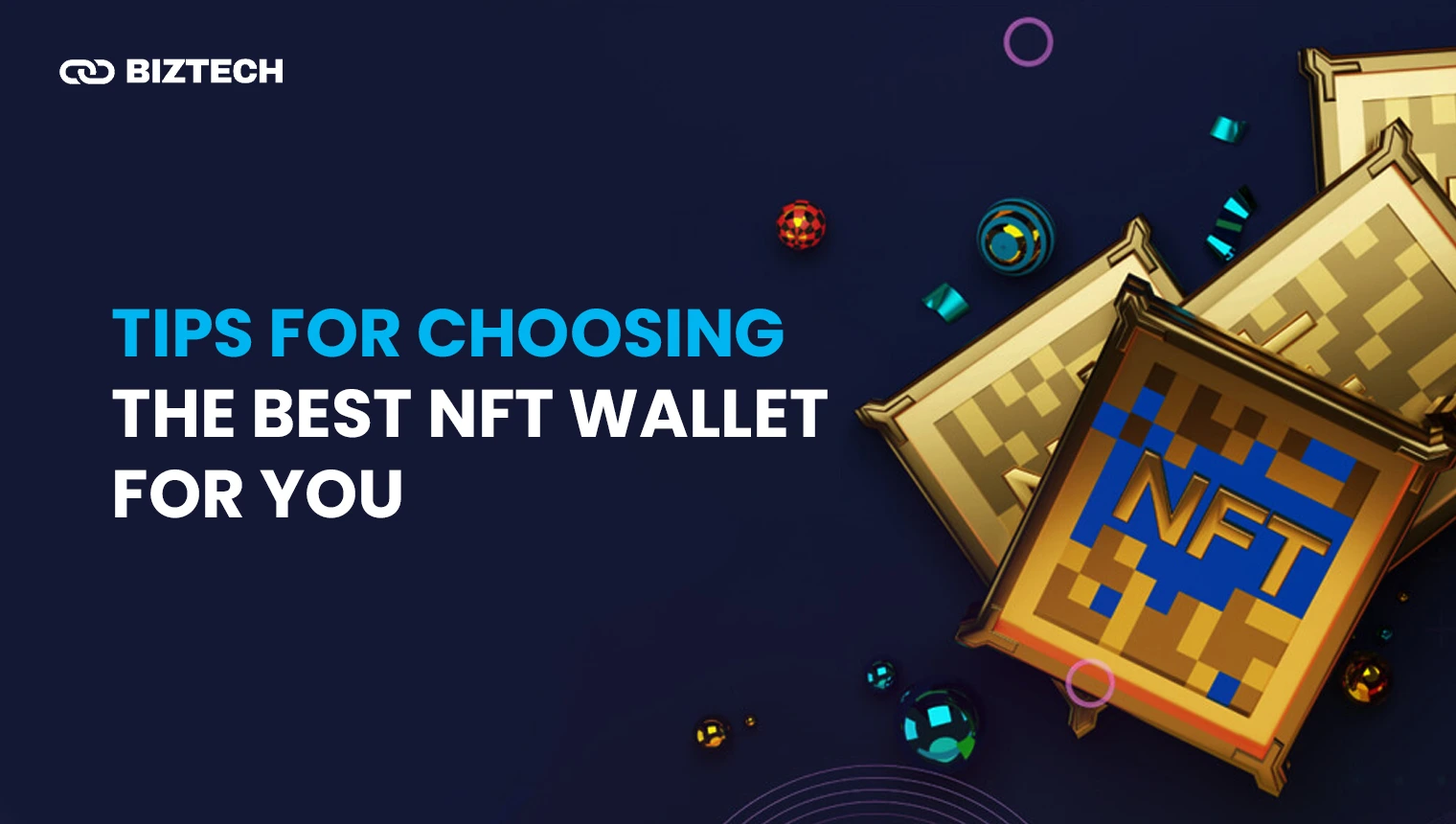So, you want to buy some NFTs. Great!
But do you know anything about storing them with something called NFT wallet? And how do you know which is the best NFT wallet in 2023?
Let’s digest the idea of NFTs first. On the blockchain, non-fungible tokens are distinctive digital valuables for assets like images, movies, wearables, tickets, or certificates linked to physical goods. As a result, each NFT is unique and verifiable because of the reliability of blockchain technology.
The acceptance of NFTs has skyrocketed. The general public now accepts them and has moved beyond the sphere of tech-savvy aficionados. The market is booming with participants from many spheres of life, including designers, musicians, artists, investors, and collectors.
You could now wonder why you require an NFT wallet. You need the best NFT wallet to store, display, and own your NFTs. Additionally, it gives users access to NFT marketplaces, making trading these special digital assets simple.
So, without further ado, let’s jump into my top 5 list.
Table of Contents
Top 5 NFT Wallets You Don’t Want to Miss Out
MetaMask: Having been established in 2016, MetaMask is a renowned NFT wallet with a long history in the industry. It is praised for its simple web3 access and multiple-address creation capability and supports over 600,000 cryptocurrencies. It began as a desktop-only wallet but has now broadened its features to include mobile syncing.
Zengo: One of the best NFT wallets for 2023 is Zengo. It is a good option for NFT holders because it combines security and usable functionality. It offers several levels of protection and control for custodial and non-custodial users. The wallet is flexible because of its distinctive features and the variety of cryptocurrencies and blockchains it supports.
Coinbase Wallet: Users who want complete control over their assets can opt for the Coinbase Wallet. With usernames and an easy-to-use browser plugin, this NFT wallet offers simple token transfers. It is a product of one of the world’s top cryptocurrency exchanges and contributes to its dependability and trustworthiness in the NFT market.
Trust Wallet: Well-known for its capability to display NFTs conveniently and mobile friendliness. It is a favourite among NFT collectors and aficionados since it provides easy access to many NFTs. The wallet’s appealing features include a user-friendly UI, a dApp connection, and quick customer service.
Math Wallet: 2019 brought the launch of Math Wallet, which provides a faultless NFT display and supports over 140 blockchains. With compatibility for 150 blockchains and a range of features, like a dApp browser, it is renowned for its adaptability. These features place Math Wallet among the top NFT wallets, making it a top choice for people looking for comprehensive blockchain compatibility.
Users should evaluate aspects like security, compatibility, supported cryptocurrencies and blockchains, and the wallet’s ability to link with dApps and NFT marketplaces while deciding on the best NFT wallet. These five wallets are the greatest options for NFT traders and collectors since they stand out in these categories.
MetaMask
The well-known digital wallet MetaMask has grown significantly in popularity thanks to its strong support for non-fungible tokens (NFTs). It is an NFT wallet allowing users to store, purchase, sell, and trade distinctive digital assets on the Ethereum blockchain.
One of MetaMask’s primary characteristics is that it works with various blockchain protocols, namely Ethereum, which is the basis for most NFT transactions. Many NFT traders and collectors favour it because of how simple, decentralised, affordable, and secure it is. Due to its wide range of compatibility, it is often recognised as one of the best NFT wallets.
| Attribute | Description |
| Type of Wallet | Non-custodial Cryptocurrency Wallet |
| Platform | Browser Extension and Mobile App |
| Blockchain Support | Mostly Ethereum, ERC-20 tokens, and other blockchains compatible with the Ethereum Virtual Machine (EVM), including Avalanche, Polygon, and Binance Smart Chain |
| Token Support | Over 500,000 tokens |
| Transaction Fees | Based on blockchain mining fees |
| Service Fees | 0.875% fee on token swaps |
| Wallet Price | Free to use |
| Security | The decentralised method provides high levels of security, but consumers are still in charge of protecting their money. |
| Notable Features | It can be transformed into cold storage devices for enhanced protection, supports anonymous cryptocurrency storage, and directs communication with decentralised applications (dApps). |
| ✅ Pros | ❌ Cons |
| Supported ERC-20 coins, dApps, and NFT marketplaces and were created for Ethereum tokens. | Lacks a desktop program and is best suited for browser-based or mobile storage |
| Supporting the staking of assets and the receipt of rewards via airdrops | Users should exercise caution when dealing with potential vulnerabilities such as phishing schemes and social engineering attempts. |
| Multiple payment methods and simple setup | Lack of privacy support for Bitcoin and CoinJoin |
| Combines with other Web 3.0 platforms | There is only email and ticket customer care available around the clock. |
| Free service, although there is a 0.875% cost for token trades. | Depending on the blockchain and congestion, transaction costs change. |
Zengo
Threshold signatures are used in Zengo, a mobile Bitcoin wallet, to provide special security. It provides a straightforward and user-friendly interface for users to manage their digital assets, including purchasing, selling, and supporting NFTs, making it a highly regarded NFT wallet in cryptocurrency.
Zengo Wallet, the finest wallet for NFTs, supports more than 120 coins and is supported by Samsung, further enhancing its reputation in the market. It has managed to have a spotless record with no reported hacking incidents because of its strong security measures.
Zengo offers a premium service called Zengo Pro that offers extra features like Legacy Transfer, Asset Withdrawal Protection, Advanced Web3 Firewall, and Priority 24/7 Support in addition to its normal capabilities. These extra features strengthen its functionality and increase its appeal to users looking for the best cryptocurrency wallet for NFTs.
| Attribute | Description |
| Type of Wallet | With cutting-edge security features like Multi-Party Computation (MPC) and a keyless recovery method, ZenGo is an on-chain cryptocurrency wallet. |
| Platform | ZenGo can be accessed via mobile. The available sources do not list the exact mobile operating systems (iOS, Android, etc.) it supports. |
| Blockchain Support | Over 70 coins are supported by ZenGo, which suggests support for various blockchains. However, none of the sources provided mention any particular blockchains. |
| Token Support | Through cooperation with Nexo, it supports more than 70 coins. |
| Transaction Fees | Charges transaction fees for different products. |
| Service Fees | Free of charges |
| Wallet Price | Free to use |
| Security | Advanced security mechanisms ZenGo uses include keyless recovery and multi-party computation (MPC). It has never been subject to hacking or cyber breaches. |
| Notable Features | Users of ZenGo can purchase, trade, and profit from cryptocurrencies. It features keyless recovery for increased security and gives customer support around the clock.
When purchasing cryptocurrency using ZenGo Wallet, new customers can receive a $10 Bitcoin cashback by entering the referral code TRADEZEN. |
| ✅ Pros | ❌ Cons |
| ZenGo offers secure crypto storage without the risk of compromised private keys. | There are limitations on the wallet in some nations and US states. |
| 24/7 customer service. | As ZenGo is a mobile-only wallet, people without mobile devices may have limited access. |
| Allows the purchase, sale, and earning of interest on several cryptocurrencies. | Fees vary depending on third-party suppliers, which could make the cost of transactions more complex and unpredictable. |
Coinbase Wallet
With the capacity to manage Ethereum-based tokens and store many coin kinds, Coinbase Wallet is a multi-coin wallet and Ethereum browser. Users can also have access to Decentralised Applications (dApps). It must be stressed that it differs from Coinbase Consumer and is a user-friendly substitute for other Web3 wallets.
However, Coinbase Wallet is a custodial wallet, meaning the business keeps custody of the keys to the digital currencies. Due to the wallet’s limited Decentralised Exchange (DEX) integration and the irreversible nature of any transactions, users need to exercise caution and ensure their recovery seed is secure.
Users may seamlessly access dApps, purchase tokens, and use DEXs by sending Ethereum (ETH) from Coinbase to the wallet. The Coinbase Wallet has established itself as a primary centre for Ethereum-based assets and dApps by supporting ERC-20 tokens, airdrops, Initial Coin Offering (ICO) tokens, and crypto collectables in addition to Ethereum.
| Attribute | Description |
| Type of Wallet | Non-custodial, software-based wallet |
| Platform | Desktop and mobile extensions |
| Blockchain Support | Includes support for a variety of blockchains, including Bitcoin, Ethereum, and Polygon |
| Token Support | Supports more than 100,000 coins, including NFTs and ERC-20 tokens |
| Transaction Fees | Charges transaction fees for different products. |
| Service Fees | Service fees apply |
| Wallet Price | Free to use |
| Security | Enhances security by enabling self-custody, privacy, and anonymity features. |
| Notable Features | Access to decentralised applications, a user-friendly UI, simple setup, staking rewards, and a novel direct messaging function |
| ✅ Pros | ❌ Cons |
| Simple transactions from Coinbase. The biggest exchange in the United States | There is no desktop software available. |
| Enables a wide range of cryptocurrencies | Partial open-source |
| Allows the purchase, sale, and earning of interest on several cryptocurrencies. | Fees vary depending on third-party suppliers, which could make the cost of transactions more complex and unpredictable. |
| Access to staking tools and NFT marketplaces, among other decentralised applications | Lacks support for multi-signature and two-factor authentication |
| A straightforward setup and configuration | Slow response from customer service |
| Improved privacy and security without requesting personal information | High trading transaction costs |
| Ethereum and Polygon NFTs exploration, staking, and presentation of decentralised applications | Involvement in a lawsuit filed by the Securities and Exchange Commission of the United States |
Trust Wallet
It is a decentralised, non-custodial cryptocurrency wallet that reportedly supports over 70 blockchains, millions of coins, and non-fungible tokens (NFTs). It can store digital assets across many different blockchains.
Users can connect with decentralised applications (dApps) like Uniswap and PancakeSwap using Trust Wallet, which also provides staking and yields farming chances for passive income. Other wallet features include swapping coins and tokens, viewing balances and transaction history, and participating in governance via the Trust Wallet Token (TWT).
Despite having numerous features, Trust Wallet offers only a small amount of direct customer assistance, and as of the most recent revisions, it only supports offline hardware wallets.
| Attribute | Description |
| Type of Wallet | Non-custodial, software-based wallet |
| Platform | Installable on browsers and accessible on desktop and mobile platforms |
| Blockchain Support | includes integration with Kyber Network and Binance Dex. It supports a variety of blockchains, including Binance’s own blockchain (BNB). |
| Token Support | 61 known coins are supported, in addition to bespoke tokens. Additionally, it offers an in-app decentralised exchange and supports NFTs. |
| Transaction Fees | Network fees that are flexible. GAS transfer outbound fees. Users need to be informed about third-party exchange costs. |
| Service Fees | 1% fee on cryptocurrency purchases that can be avoided by keeping at least 100 Trust Wallet native $TWT tokens in your account. |
| Wallet Price | Free to use |
| Security | A private, data-free environment, control over private keys, Touch ID or Face ID, and protection from hackers and scammers are examples of high-end security features. There is no setup requirement for KYC compliance. |
| Notable Features | 12 cryptocurrencies can be staked, NFTs are supported, access to cryptocurrencies is simple, interest can be earned on holdings, and decentralised applications can be accessed.
Additionally, it permits instantaneous trade without requiring lengthy forms and card purchases for cryptocurrency. is set up in three easy steps: download the app, establish a wallet, and buy cryptocurrency. It offers email customer assistance. |
| ✅ Pros | ❌ Cons |
| Supports a wide variety of digital assets, including bespoke tokens and more than 60 cryptocurrencies | Requires additional measures for secure storage because it is difficult to convert to offline storage. |
| Simple integration with Binance | Lacks support for multi-signature and two-factor authentication |
| Provides applications for PC, mobile, and browsers. | For greater protection, it does not offer direct links to cold wallets |
| Decentralised exchange (DEX) features within the app and support for staking 12 coins | It does not support hardware wallets |
| It puts a focus on user security with choices for Touch ID or Face ID | Customer support is scarce |
| Preventing the need for KYC compliance during setup, protecting user privacy | The dApp browser was deleted from the iOS version, and the Android source code is not publicly accessible. |
Math Wallet
Over 100 blockchains are supported by this incredibly flexible and multi-platform wallet. It is offered as a browser extension and for desktop, Android, and iOS browsers. The wallet can access different decentralised applications (dApps), receive, send, and transfer tokens. Additionally, it enables storing tokens for various public blockchains, including BTC, ETH, Kusana, Polkadot, Solana, Cosmos, Filecoin, BSC, and others.
Math Wallet offers user-friendly interfaces, a dApp store, and support for NFTs. It has MathChain, a para chain inside Polkadot, and direct staking from the app.
Both custodial and non-custodial alternatives are available for the wallet, with the latter being recommended for secure storage. Additionally, it supports several security features, including security locks, 2-factor authentication, private keys and mnemonic phrases.
| Attribute | Description |
| Type of Wallet | Choices between custodial (cloud wallet) and non-custodial (extension wallet). |
| Platform | Available on desktop browsers, Android, iOS, and as a browser extension |
| Blockchain Support | Includes more than 100 blockchains |
| Token Support | Supports a variety of coins on the Ethereum network, including its own MATH token |
| Transaction Fees | Blockchain use costs apply when transmitting transactions or utilising dApps. |
| Service Fees | There are costs associated with wallet transfers. |
| Wallet Price | Free to Use |
| Security | The non-custodial approach uses private keys and mnemonics to guarantee decentralisation and security.
Supports hardware solutions and offers a variety of security features to consumers |
| Notable Features | Provides direct staking within the app and access to dApps and regular wallet functions.
It offers advantages comparable to Layer2 solutions using MathChain on Polkadot and a dApp store. |
| ✅ Pros | ❌ Cons |
| More than 60 supported blockchains, including well-known ones | In Math Wallet, several blockchains, including Bitcoin, are not supported. |
| Access to DeFi protocols and NFT marketplaces.
Decentralised apps (dApps) are provided. |
Some users claim that various functionalities have bugs and take a long load. |
| Allows for integrating hardware wallets, simple cryptocurrency trading, and staking services for passive income. | Improvements are needed in customer support |
| The user interface is simple to use. | There needs to be clarity between Math Wallet and Math Wallet 5. |
| Provides its own cryptocurrency, $MATH, for MathVerse, a blockchain-based metaverse. | Multi-factor authentication and hardware wallet integration protect user funds, but users must guard private keys. |
| Positive reviews for ease of use and customer service | When using dApps or conducting transactions, users are required to pay blockchain fees. |
Best NFT Wallet: Know About These Features
We took it upon ourselves to learn more about the world of NFTs and the critical function of NFT wallets. After all, securing your personal art gallery, trade platform, and treasure chest in the dynamic world of digital artefacts is vital.
We will examine important factors that make an NFT wallet ideal and legitimate for you. Each NFT wallet has its own features that cater to various needs and tastes.
Web-based, desktop-based, or mobile-based wallets like Metamask, Math Wallet, Zengo, Coinbase Wallet, or Trust Wallet are some of the best NFT wallets. Each has distinctive features and advantages, such as Coinbase Wallet’s username-based token transfers or Math Wallet’s flexible cloud, mobile, and web support, which works with over 140 blockchains.
We consider some important factors in our quest to discover the best NFT wallet.
Be it ZenGo, with its user-friendly interface and security, or MetaMask, with its ability for cross-device use and NFT display on multiple blockchains, we’ll be discussing how these factors come together to make them contenders for the title of the best crypto wallet for NFT.
Security
Security is still of utmost concern when looking for the best NFT wallet. Often, the level of security is what sets a good wallet apart from an average one. You can manoeuvre more confidently through this developing digital environment by knowing the basic security procedures and features linked to these wallets.
Your non-fungible tokens are safe in a secure NFT wallet, which also secures the confidentiality of your data and transactions. This is accomplished via various ways, including secure private key creation and storage methods, two-factor authentication (2FA), biometric identification, and multi-signature support.
Wallets with private key management capabilities typically provide a higher level of security. This is because your private keys provide your NFTs full access; if they were to get into the wrong hands, your NFTs would be in danger. As a result, wallets that provide users access to their private keys rather than keeping them on their servers are frequently thought of as more secure.
On the other hand, hot wallets are more prone to hacking because they constantly connect to the internet or keep private keys online. By keeping private keys offline, offline wallets (also known as crypto cold wallets) give an extra layer of security and are impervious to online hacking efforts.
Comparison between custodial & non-custodial wallet
An NFT wallet’s security is likewise inextricably related to whether it is a custodial or non-custodial wallet.
For your digital assets, custodial wallets function similarly to banks. In these procedures, private keys are stored and protected by a third-party service.
Besides, they have a user-friendly option because they provide certain conveniences like transaction facilitation (often at no cost) and control of the technical aspects of cryptocurrencies.
These wallets do, however, carry some dangers. The most apparent danger is that you don’t have direct control over your NFTs. Furthermore, custodial wallets are less secure because your private keys are kept by the service, making them potentially vulnerable to data breaches.
On the other hand, non-custodial wallets provide you complete control over possessing private keys. This gives you more freedom and security because you have total control over your NFTs and other digital assets.
Their rising acceptance is largely attributed to the safety precautions and user control they offer. This independence does, however, come with a unique set of duties. Since no one else has access to your private keys, recovery in the event of loss or forgetting them could be extremely difficult.
A compromise between convenience and security must be made when deciding between custodial and non-custodial wallets. The best NFT wallet should suit your needs, degree of experience, and risk tolerance.
Multichain Support
The best NFT wallet is determined in large part by the multichain compatibility it offers. The number of blockchains that enable NFTs has increased along with the blockchain ecosystem. The best NFT wallet must have multichain compatibility to accommodate a wide range of NFTs that exist on many blockchains.
The core of multichain support is the capacity to manage distinct NFT types on different blockchains. It makes way for increased NFT functionality and accessibility. If an NFT wallet is multi-blockchain compatible, you may store, manage, and trade NFTs from various blockchains in a single location, maximising your convenience and flexibility.
The Math Wallet, for instance, is renowned for supporting more than 150 blockchains and providing a wide range of NFT compatibility. Thanks to this feature, users can freely explore the growing NFT world without being restricted to a certain blockchain.
The Ethereum network is supported by MetaMask, another highly recommended NFT wallet, offering a portfolio tracker for NFTs. Its capacity to administer several Ethereum-based tokens and NFTs, although being largely Ethereum-centric, is an example of multichain support for the Ethereum blockchain ecosystem.
The type of NFTs you intend to manage, the blockchains these NFTs are stored on, and your personal demands will ultimately determine the best crypto wallet for NFTs. Although Ethereum is still a popular platform for NFTs, the multichain support feature is becoming more attractive as NFTs appear on other blockchains.
To accommodate a wide range of NFTs, the ideal NFT wallet should offer full multichain support, a fluid user experience, solid security, and timely customer service.
User Experience and Interface
In the world of NFTs, a user’s interaction with a platform and their NFTs can be greatly impacted by the user experience and interface of an NFT wallet. For customers to effectively manage and trade their NFT assets, the best NFT wallet should offer a seamless user interface and intuitive experience.
First, it should be simple to use and navigate. For instance, ZenGo is a top choice for people new to the NFT industry because it is user-friendly for beginners and has an intuitive interface.
Additionally, it ought to offer choices for visual displays that improve the browsing and administration of NFTs and provide users with a gallery view. Such is especially the case for NFTs surrounding art or collectables, as it gives users a visual overview of their NFT collections.
For interactions between the user, their wallet, and the multiple NFT marketplaces to go well, it should include dApp connectivity and simple token transfers. For instance, many users favour MetaMask since it supports numerous tokens and offers simple access to NFT marketplaces.
In terms of user experience, your best NFT wallet should incorporate a platform with a user-friendly design, quick navigation, visual display options, dApp connectivity, and simple token transfers. These features make it possible to manage and trade NFT assets effectively.
Fees and Transaction Speed
When selecting the best NFT wallet, considering the fees and transaction speed is essential. These elements can greatly impact the trading experience and overall expenses related to purchasing, selling, or owning NFTs.
The network on which an NFT wallet runs is an essential element to consider when assessing the costs related to the wallet. For instance, while previously dominating NFT sales, Ethereum has struggled with high petrol costs. In contrast, speedier and less expensive possibilities for constructing NFT marketplaces include Flow, Solana, Cardano, and Binance Smart Chain.
The usability of an NFT wallet is dependent on transaction speed as well. When trading in brisk NFT marketplaces, slow transaction rates can cause annoyance and inefficiencies. Therefore, for a seamless user experience, selecting a wallet that guarantees quick transaction processing is crucial.
The user should search for a platform with minimal or no fees and quick transaction speeds when looking for the best NFT wallet. For the dynamic NFT markets, these characteristics guarantee a cost-effective and efficient trading experience.
Tips for Choosing The Best NFT Wallet for You
Selecting the best NFT wallet for you could seem difficult given all the alternatives. Here are some pointers to help you with the selection process:
1. Identify Your Needs
The characteristics and functionalities of wallets vary. Decide what features you want. Do you want to use numerous addresses, NFT marketplaces, swap features, and cross-blockchain compatibility?
2. Security
It must be equipped with top-notch security. This includes the level of encryption and how the private keys are managed, be it hot (online) or cold (offline).
3. User Interface
Particularly for people who are unfamiliar with NFTs, a user-friendly interface is essential.
4. Cross-Device Access
Do you require numerous devices to access your NFTs, or is a mobile-only solution like Trust Wallet more appropriate? The best NFT wallet should be easily available wherever and whenever needed.
5. dApp Support
It should support dApps or decentralised applications. Gaming, DeFi platforms, and NFT marketplaces are all included in this.
6. Multi-chain Support
Support for numerous blockchains is essential since NFTs can exist on various blockchains, including Ethereum, Solana, Polygon, Cardano, Tezos, and Binance Smart Chain. For instance, Math Wallet has cross-chain NFT capabilities and supports over 70 blockchains.
7. Customer Support
Strong customer assistance can save your life when you have difficulties, even though you may not need it frequently.
Conclusion
With the best NFT wallet at your disposal, you could easily plunge into the revolutionary world of NFTs.
Whether it’s Zengo’s user-friendliness, MetaMask’s multi-chain support, or Math Wallet’s amazing dApp features, make sure you consider the factors most relevant to you.
The best NFT wallet can provide you with access to gaming, the arts, and more. Therefore, don’t hesitate; secure your digital assets now and enter the potential world of NFTs.
